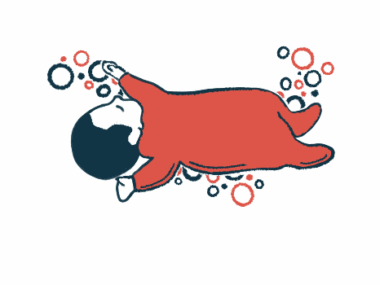Learning to Let Go and Share the Dravet Syndrome Burden
Written by |

For the past five years, I have been with my daughter Austen during every doctor’s appointment, blood draw, and medical test and procedure.
Every time she’s walked through the doors of the doctor’s office or hospital, she’s been holding my hand. Every time she’s cried over a needle poke, my arms were the ones to comfort her — until today.
This morning, I packed Austen’s bag, brushed her hair and teeth, and loaded her into the car like I normally would. But today, I was the one standing at the door waving goodbye while my husband backed out of the driveway with our youngest baby in tow.
Austen was off to a planned 24-hour hospital stay to get a new baseline electroencephalogram (EEG). Thanks to Fintepla (fenfluramine), she’s been doing so well that we can see if she’s seizure-free or having any invisible or small absence seizures that we aren’t always catching.
Today, it was her daddy who held her hand as she walked through the door of the hospital. He distracted her while the EEG wires were being glued to her scalp. And he was the one who spent most of his day entertaining an energetic 5-year-old trapped in a hospital room with few things to do.
We decided on this route because I am not just a mama, but also the head teacher in our home. If I went to the hospital with Austen, it would mean that all three of our kids would miss two full days of learning. This way, I was able to teach the other two kids while he took care of Austen.
I admit I cried when they pulled out of the driveway. I’m a bit of a control freak, and I have a habit of being a crybaby. But Austen was excited to have her daddy go with her, and from what I heard, her excitement didn’t wane throughout the day.
But I found myself worrying throughout the day. Although I cherished the time with my older children and being able to get things done around the house, my mind kept wandering to that hospital room and what was going on there.
Would Austen think I had abandoned her? What if an emergency happened? What if the doctors said something important and my husband forgot to tell me?
I had to stop myself from calling every five minutes and trust he had it covered. And he did.
It turns out our girl had been keeping the nurses on their toes all day. I went to sit with her this evening while my husband ran an errand. Austen and I tucked in for a dinner of hospital pizza (her favorite) and a showing of “The Secret Life of Pets” (also her favorite) while we waited for Daddy to return.
As I sat in that hospital room cuddled in bed with my baby girl, I realized how much I should cherish this time. My husband took good care of our girl today, and the world didn’t crumble because I wasn’t here with her. She thrived during the one-on-one time with her daddy, and my older kids thrived in their alone time with me.
Mom guilt is tough, and the more kids you have, the tougher it gets. Throw some medical needs into the mix, and you find yourself walking a fine line between sanity and considering whether a stint in the hospital for “utter exhaustion” that celebrities give themselves could be arranged for you.
I realize it’s not my husband’s fault that I’ve always been the one to take the kids to their appointments. As I mentioned before, I’m a control freak. I like to know what’s going on in real time, and believe I can control the situation more if I’m there.
Is that the healthiest way to cope? Probably not. But it’s what I do.
What today taught me was that it is not only OK, but vital for me to let go sometimes. My husband needs to be hands-on in the process just as much as I do, and I need to let him.
Doing so helps to create a well-balanced rhythm in our family, where all of our kids have the attention they need from all of their parents.
Letting go is hard, but it’s a necessity. I am in a situation in which I don’t have to carry the burden of Dravet syndrome solely on my shoulders — I have a partner willing to help me carry it. I just have to let him.
***
Note: Dravet Syndrome News is strictly a news and information website about the disease. It does not provide medical advice, diagnosis, or treatment. This content is not intended to be a substitute for professional medical advice, diagnosis, or treatment. Always seek the advice of your physician or other qualified health provider with any questions you may have regarding a medical condition. Never disregard professional medical advice or delay in seeking it because of something you have read on this website. The opinions expressed in this column are not those of Dravet Syndrome News or its parent company, Bionews, and are intended to spark discussion about issues pertaining to Dravet syndrome.






Sharbari Roy
Hi magan is the fintepla working for atypical absence seizures.my daughter has dravet and has lots of atypical absences throughout the day.she is on stiripentol and other five antiepileptics.she is 5 and a half years old.